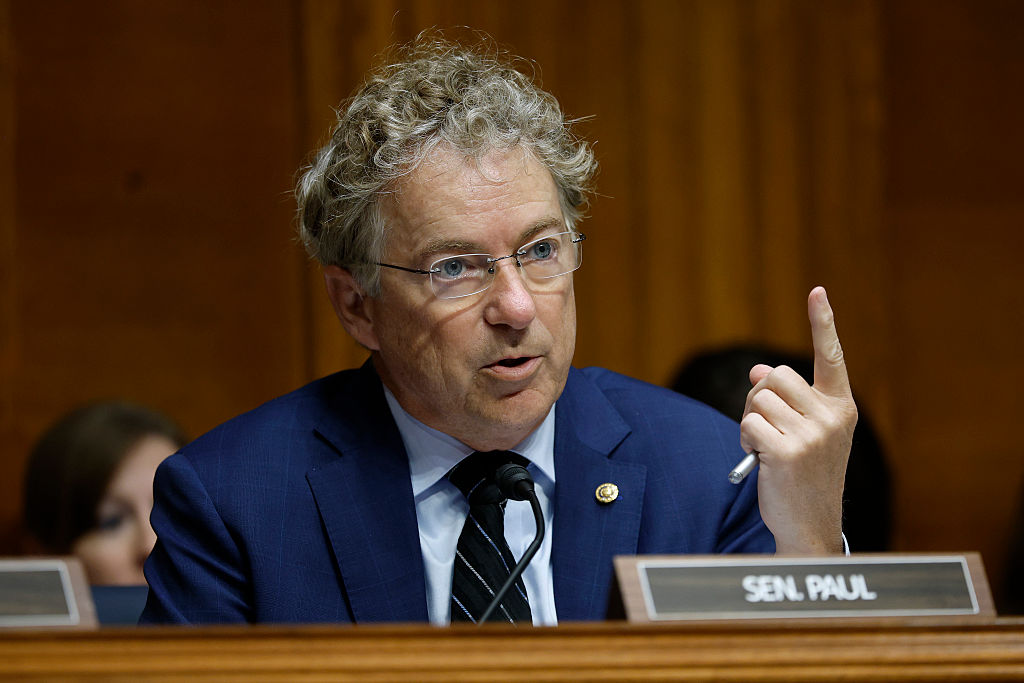Less than a month after the Senate rejected an effort to block President Donald Trump’s bombing of alleged drug-trafficking cartel boats, Senator Rand Paul intends to continue to push the issue. The Kentucky Republican tells TIME an updated resolution could be brought to a vote as soon as next week with the goal of drawing enough bipartisan support to block Trump from continuing to expand the strikes.
[time-brightcove not-tgx=”true”]
“The idea that you’re going to treat humans as just, you know, as refuse, that, ‘Oh, we don’t care if we kill them because they’re not Americans and they can be on the high seas’ is such a callous position,” Paul told TIME in an interview on Tuesday. “It’s an issue that I am not going to give up on.”
Trump has approved a series of military strikes against alleged drug smuggling boats in the past two months, killing at least 57 people. Defense Secretary Pete Hegseth announced Tuesday that military strikes hit four more boats in the Pacific off the Central and South American coasts the day before, killing 14 people, making Monday the highest known death toll in a single day since the operations were made public last month.
Trump said he is fighting a war against drug cartels and the strikes are aimed at stopping the flow of narcotics coming to the U.S. Experts have questioned this argument, noting that the boats shown in videos aren’t carrying enough fuel to reach the U.S., and arguing that such attacks won’t slow the flow of drugs into the country.
Article 1 of the Constitution specifically gives Congress the power to declare war. Earlier this month, the Senate rejected a resolution from Paul and Democratic Senators intended to stop the Administration’s bombing campaign. Lisa Murkowski of Alaska was the only Republican to join Paul in supporting it.
Paul says the updated resolution is more narrowly tailored toward Trump’s actions against Venezuela, with the hope of getting more members of his party to sign on. The earlier resolution, which was defeated 48-51 on Oct. 8, would have blocked the military from attacking nom-state organizations involved in trafficking drugs. “If you want to have the rules of engagement where you blow people up without asking questions—that’s war—but the prerogative of war is exclusively the legislature,” Paul says.
The boat attacks have been joined by a military buildup in the Caribbean off the coast of Venezuela. The aircraft carrier Gerald R. Ford has been ordered to move toward Latin America from the Mediterranean Sea. Speaking to reporters on Oct. 15, Trump said he was considering expanding the military campaign to targets on land and that he had authorized the CIA to conduct operations inside Venezuela.
The Venezuela government said on Sunday that it had captured mercenaries who had been directed by the American intelligence agency to conduct a false-flag attack where the identity of the perpetrators is obscured. Those claims could not be independently verified. The CIA would not comment on whether Venezuela had intercepted one of its operations.
The escalating military campaign has drawn speculation that the Trump Administration’s real goal is to oust Venezuela’s dictator Nicolás Maduro. Paul says he views such a goal as a mistake that would go against Trump’s long-standing opposition to entangling the U.S. in “a regime change war.” Paul, who has been a Senator since 2011, previously opposed Obama’s use of drone strikes against suspected terrorists in Yemen, Pakistan and Somalia. “The idea of just killing people without any kind of process is not new to Donald Trump, but he’s building on the legacy of President Obama as far as this goes,” Paul says.
Sen. Lindsay Graham said on Sunday that he had spoken to Trump the day before and the President’s “end game” is to “make sure that Venezuela and Colombia cannot be used to poison America, that the narco-terrorist dictator Maduro no longer be able to threaten our country and to send in drugs to kill Americans.”
Paul is hoping that more Republicans join him in opposing Trump’s military actions in Latin America and the Caribbean without Congressional authorization. The next resolution he and Democrats plan to introduce will be more narrowly tailored toward Trump’s actions against Venezuela, with the hope of getting more GOP senators to sign on.
Paul says he has not been among those in Congress who has been offered a briefing from the Trump Administration on the deadly strikes, and did not believe a briefing would be enough to allay his concerns. He sees passing a war powers resolution as the best tool at Congress’ disposal to reining Trump in. Yet even if such a measure were to pass in the Republican-controlled House and Senate, it’s still unlikely to become law. Trump would likely veto it, requiring a two-thirds majority in both chambers to override the veto.
Still, Paul intends to keep pressing the issue. “The debate itself is still important whether we win or not,” he says.

